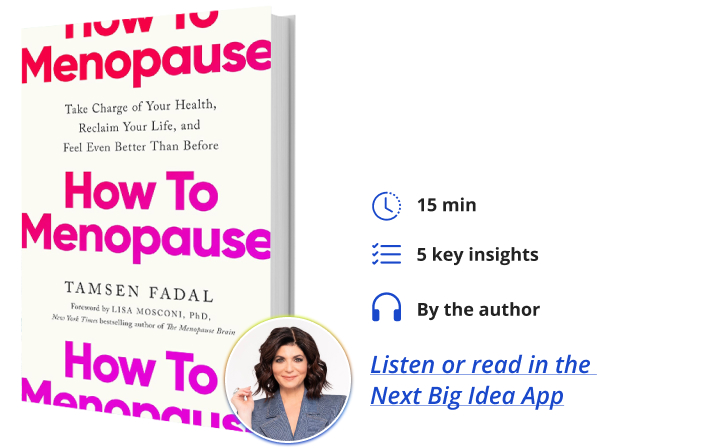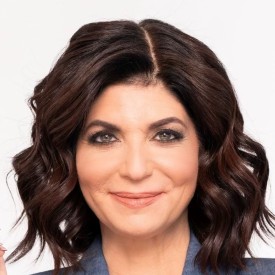Tamsen Fadal is an Emmy Award-winning journalist, author, documentary filmmaker, and social media’s “midlife mentor.” After more than three decades as a news anchor, she made the decision to pivot her career toward women’s advocacy, building a resource so women can thrive during menopause and midlife. In her journey to understand what was happening to her at the onset of menopause, she built a community of women grappling with the same experiences and created the documentary The M Factor: Shredding the Silence on Menopause for PBS. She holds a certificate in holistic health coaching from the Institute for Integrative Nutrition and serves on the national board of Let’s Talk Menopause. Her regular appearances in media include Oprah Daily, The Today Show, the New York Times, and Harvard Business Review.
What’s the big idea?
When Tamsen Fadal didn’t finish a newscast for the first time in decades, she had menopause to blame for triggering an epic hot flash on live TV. It took six doctors before she found proper treatment for her menopause symptoms. Though the start of this chapter can be scary for women—with intense hormone fluctuations and difficulty finding experts and resources—many can come to discover, like Tamsen, that a lot of beauty can emerge from this complicated stage of life. Menopause is a journey to freedom: an opportunity to reinvent your life for the better.
Below, Tamsen shares five key insights from her new book, How to Menopause: Take Charge of Your Health, Reclaim Your Life, and Feel Even Better than Before. Listen to the audio version—read by Tamsen herself—in the Next Big Idea App.

1. Menopause is a new beginning.
Many women see menopause as an ending—the end of their reproductive years, youth, or even desirability—but it can be a period for rediscovery and growth. It can be scary at the moment when you are grappling with fluctuating hormones or symptoms you don’t understand. Still, once you acknowledge that you are going through a major life transition and make a plan to reduce your symptoms, you can recognize menopause for what it truly is: a journey to freedom. You’ve passed the expected social milestones, such as marriage and children, dealt with the decision of whether to pursue them or not, and you’re free to write your own script—to invent your own life.
Since entering menopause, I have embarked on a new career, married the love of my life, and discovered greater meaning and purpose in my life.
Research shows that postmenopausal women are generally happier, and you can be too! You have the power to take charge and transform this journey into a vibrant, inspiring chapter, turning your postmenopausal years into the most beautiful time of your life.
2. Menopause symptoms are treatable.
The medical system is not designed to treat women in midlife, but that doesn’t mean you can’t get treatment by advocating for yourself.
Menopause affects all women differently. There are 34 symptoms linked to menopause and perimenopause, the period before menopause that typically happens when women are between the ages of 40 and 50, and women may experience any combination of them. Most of these symptoms can be managed, but doctors often don’t have the training to recognize that these symptoms are related to menopause, much less treat them.
I saw six doctors before I finally got the menopause-specific help I needed, and I experienced symptoms like hot flashes, brain fog, and night sweats that are commonly associated with menopause. If you experience heart palpitations, anxiety, or acne, doctors may not even recognize that menopausal hormone fluctuations are causing the symptoms.
“More than half of doctors only experienced one lecture about menopause in medical school—if they received any training whatsoever.”
It’s shocking to learn just how little education doctors receive on menopause, even doctors who specialize in women’s health. More than half of doctors only experienced one lecture about menopause in medical school—if they received any training whatsoever. Every woman will go through menopause, so doctors are not being educated on the symptoms of a transition that will impact half the population!
There is no one-size-fits-all solution to treating menopause symptoms. I’ve found hormone therapy life-changing, but each woman will need to decide what is right for her. If possible, I’d strongly recommend finding a certified menopause practitioner. If that isn’t possible, I’d recommend learning as much as possible so you can advocate for yourself and ensure you get the treatment you need. We not only deserve to feel better on a daily basis but to have access to the information and strategies that will help us stay healthy well into old age.
3. Workplaces should do more to support menopause—it’s good business.
There are currently 41 million women over the age of 40 in the workforce. Starting in perimenopause, fatigue, difficulty sleeping, poor concentration, and poor memory can affect performance at work, but many of us keep our symptoms secret from employers and coworkers because of the stigma around menopause. I was afraid of the repercussions at work—especially that I might be viewed as less competent and less relevant than before.
Yet hiding the symptoms doesn’t make them go away. As a result, an astonishing one in five women in the United States has left or has considered leaving a job due to menopause symptoms. The higher up you are in the organization chart, the more likely you are to quit a job because of perimenopause or menopause symptoms, which also means companies are losing top talent, costing them money and productivity.
From providing menopause benefits to simply creating a workplace where women feel comfortable sharing their experiences with menopause and can openly work to find solutions, there are numerous ways companies can better support women in menopause.
4. Menopause is an opportunity to make a midlife edit.
Beyond health, menopause comes with new challenges and changes we don’t always understand. It impacts all areas of a woman’s life: work, nutrition, beauty and lifestyle, sleep, relationships, self-image, and life purpose. The workout routine and skincare regimen that worked when you were 20 may not work effectively anymore, but it’s possible to adapt and reevaluate your lifestyle to come out better, stronger, and more fulfilled on the other side.
“Now that I have finally found myself again, I’ve realized that I like the new version of myself even better!”
Menopause can be an opportunity to update your makeup, style, and wellness routine. It’s not always easy to feel good about your appearance and embrace your current reality. I spent a long time looking for “me” as I struggled through menopause. Now that I have finally found myself again, I’ve realized that I like the new version of myself even better! By embracing who you are and what you look like now, it’s possible to be the bold, beautiful, confident person your younger self dreamed of becoming.
5. Menopause impacts men too.
Women experience menopause, but men live with us, work with us, and often experience what we are dealing with, whether they know it or not. Men want to know how to help the women in their lives. They often feel confused by rejection in the bedroom or the fact that their partners love them one day and are angry at them the next.
Nearly 35 percent of divorces each year happen when couples are aged 55 or older,
and since 1990, the divorce rate of people over 50 has doubled. There are numerous factors that could lead to divorce at this stage of life—reprioritization, growing apart, and kids having grown. However, menopause symptoms, such as irritability, anxiety, and loss of libido could also play a role. This doesn’t mean that women are irrational or don’t know their own mind, but menopause can lead to loss of intimacy or give women newfound clarity that helps them realize what they are no longer willing to tolerate. Additionally, the strain of dealing with the physical symptoms of menopause can exacerbate existing issues.
When I started talking about menopause, I didn’t think men would be interested in what I had to say until I started seeing one comment after another in my inbox from men asking for advice. That’s when I realized that menopause is a universal issue that everyone needs guidance about.
To listen to the audio version read by author Tamsen Fadal, download the Next Big Idea App today:
































